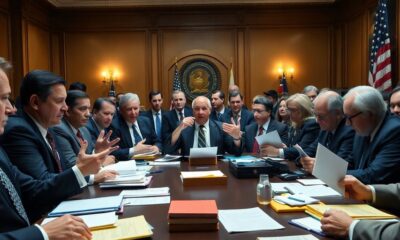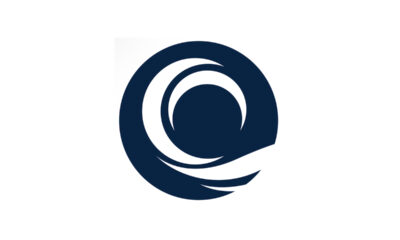Elections
Political News Analysis: Key Issues and Events Shaping the Political Landscape
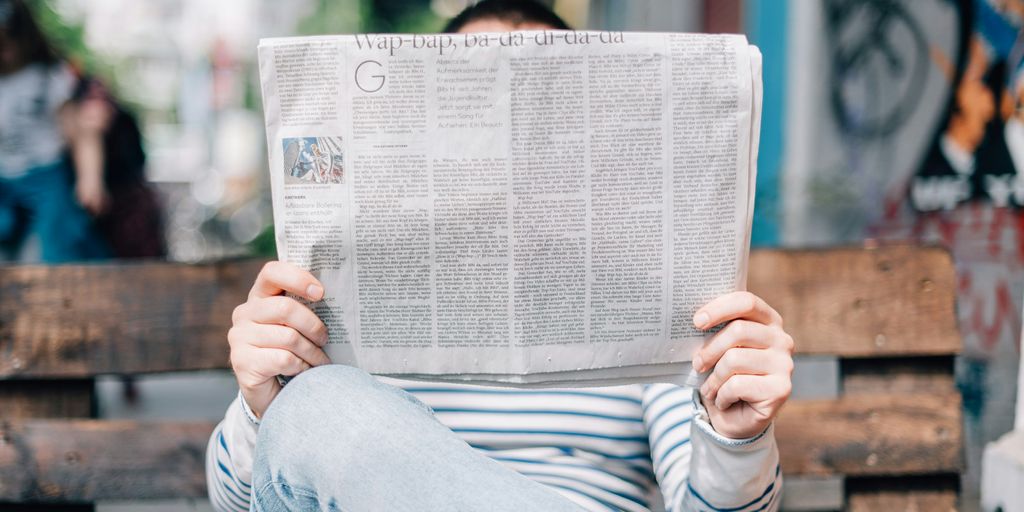
In today’s political world, many Americans have strong opinions about how their government works. Some believe the system has serious issues, while others see strengths that can be built upon. This article explores what people think about the U.S. political system, its leaders, and the challenges ahead. By understanding these views, we can better grasp the current political climate and what might change in the future.
Key Takeaways
- Many Americans feel frustrated with the political system, citing issues like lack of trust and accountability.
- Despite problems, some people believe in the strengths of democracy, like voting and citizen involvement.
- Trust in the federal government is low, but local leaders often receive better ratings from their communities.
- The divide between the Republican and Democratic parties remains significant, affecting public perception and party loyalty.
- Political discussions can be stressful for many, with a majority feeling overwhelmed by the negativity in political debates.
The Biggest Problems and Greatest Strengths of the U.S. Political System

In Their Own Words: Americans on the Political System’s Biggest Problems
Many Americans express frustration with the political system. A common concern is the influence of money in politics, where large corporations and special interests seem to have more power than ordinary citizens. This leads to feelings of isolation among voters, as they believe their voices are not heard. For instance, one man in his 60s stated, "The people have no say in important matters."
Another significant issue is the deep divisions between political parties. About 20% of adults feel that the lack of cooperation among elected leaders is a major problem. A man in his 70s noted, "Both parties are so busy trying to stop each other that they waste opportunities to solve our nation’s problems."
| Problem Area | Percentage of Respondents |
|---|---|
| Influence of Money in Politics | 7% |
| Lack of Cooperation Between Parties | 20% |
| Media Bias | 9% |
| Government Failures | 6% |
In Their Own Words: Americans on the Political System’s Greatest Strengths
Despite the challenges, some Americans see strengths in the political system. Many point to the checks and balances established by the Constitution as a key strength. A man in his 20s mentioned that the separation of powers works well, while another in his 30s highlighted the importance of these checks to prevent unilateral changes.
However, a significant number of people feel that the system lacks a clear strength. Over half of respondents either could not identify a strength or chose not to answer. A woman in her 60s expressed her disappointment, saying, "I’m not seeing any strengths!"
| Strength Area | Percentage of Respondents |
|---|---|
| Checks and Balances | 12% |
| Individual Freedoms | 9% |
| Right to Vote | 8% |
The political system is a mix of strengths and weaknesses. While many feel disillusioned, the principles of democracy and the Constitution still offer hope for change.
Are There Clear Solutions to the Nation’s Problems?
Finding solutions to these issues is complex. Many Americans believe that improving cooperation between parties and reducing the influence of money in politics could lead to a healthier political environment. However, achieving these changes requires a collective effort from both leaders and citizens.
Views of the U.S. Political System, the Federal Government, and Federal-State Relations
Evaluations of the Political System
Many Americans have a negative view of the political system. They often see it as filled with partisan fighting and influenced by special interests. A significant number believe that the high cost of political campaigns makes it hard for good candidates to run. In fact, a recent survey showed that 86% of people think Republicans and Democrats focus more on fighting each other than solving problems.
Trust in the Federal Government
Trust in the federal government is low. While some believe that ordinary Americans want to make the system work, many feel that the government does not get enough credit for its efforts. Only 22% of Americans think that political leaders face consequences for unethical actions, which shows a lack of faith in accountability.
The Relationship Between the Federal and State Governments
The relationship between federal and state governments is complex. Many people feel that the federal government does more for ordinary Americans than is recognized, but opinions vary widely between political parties. For instance, 54% of Democrats believe the federal government helps more than people think, while only 26% of Republicans share that view.
| Description of Political System | Percentage of Agreement |
|---|---|
| Too much partisan fighting | 86% |
| Campaign costs are too high | 85% |
| Lobbyists have too much say | 84% |
| Ordinary Americans want to help | 63% |
The public sees many federal agencies favorably, but Republicans are becoming more critical of the Justice Department. Overall, many federal agencies are viewed positively.
How Americans View Congress, the President, and State and Local Political Leaders
Americans’ Ratings of Their House Member, Governor, and Local Officials
Many Americans have a negative view of their political leaders. Most people believe that Congress and the President are not doing a good job. A recent survey shows that a large number of citizens feel frustrated with how their representatives are performing.
| Political Leader | Positive Rating (%) | Negative Rating (%) |
|---|---|---|
| Congress | 28 | 72 |
| President | 36 | 64 |
| Local Officials | 45 | 55 |
In a world where information is everywhere, many find it hard to get unbiased news about politics. About 68% of people say it’s tough to find fair information about what’s happening in the political scene.
The public often feels that political leaders are more focused on fighting each other than on solving real problems. This leads to a sense of distrust and disappointment in the political system.
Views on the Effectiveness of Political Leaders
When asked about the effectiveness of their leaders, many Americans express doubt. They often feel that their local officials are more in touch with their needs than those in Congress or the White House. However, even local leaders face criticism, with many people believing they could do better.
Public Opinion on Political Accountability
Accountability is a big issue for many. Only 22% of Americans think that political leaders face consequences for acting unethically. This lack of accountability makes people feel that the system is unfair. Many believe that the influence of money in politics is a major reason for this problem.
In summary, Americans are not satisfied with their political leaders at any level. They want more accountability and better representation, and they often turn to news websites for information on these issues.
The Republican and Democratic Parties: Ideologies and Public Perception
Party Favorability Ratings
In recent surveys, both the Republican and Democratic parties have seen fluctuating favorability ratings among the public. Currently, registered voters are nearly evenly split between the two parties, reflecting a growing divide in political beliefs. The table below summarizes the favorability ratings:
| Party | Favorability Rating (%) |
|---|---|
| Republican | 45 |
| Democratic | 46 |
Quality of the Parties’ Ideas
When it comes to the ideas presented by each party, opinions vary widely. Many Americans feel that the ideas from both parties often miss the mark. However, a significant number of people still believe that their party’s ideas are more aligned with their values. This sentiment is particularly strong among Republicans, with 58% identifying as traditional compared to just 19% of Democrats who feel the same way.
Most Characterize Their Party Positively
Despite the criticisms, a majority of party members view their own party positively. This loyalty can be attributed to shared values and beliefs that resonate with their personal experiences.
The political landscape is marked by deep divisions, yet many Americans still find hope in their party’s vision for the future.
Overall, the perception of both parties is complex, with many Americans expressing dissatisfaction with the current political climate while still holding onto their party affiliations.
Money, Power, and the Influence of Ordinary People in American Politics
Influence in Congressional Decision-Making
The role of money in politics is a major concern for many Americans. A significant number believe that special interests and lobbyists have too much power in shaping decisions made in Congress. This perception raises questions about how much influence ordinary citizens truly have in the political process.
Views on Limiting the Role of Money in Politics
Many people think that limiting the influence of money in politics is essential for a fair system. A recent survey showed that 85% of respondents agree that the high cost of political campaigns makes it difficult for good candidates to run for office. This suggests a strong desire for reforms that would make the political landscape more accessible to everyone.
How Much Can Voting Affect the Future Direction of the Country?
Voting is seen as a powerful tool for change. However, many Americans feel that their votes do not carry enough weight in the grand scheme of things. A majority believe that ordinary Americans care about making the political system work well, yet they often feel overshadowed by the influence of money and power.
The dynamics of power within states can often leave ordinary citizens feeling powerless. Understanding these dynamics is crucial for fostering informed civic engagement.
| Issue | Percentage of Americans Who Agree |
|---|---|
| Special interests have too much influence | 84% |
| Campaign costs hinder good candidates | 85% |
| Ordinary Americans want a better system | 63% |
Americans’ Feelings About Politics, Polarization, and the Tone of Political Discourse
Politics in a Single Word or Phrase: An Outpouring of Negative Sentiments
Many Americans express their feelings about politics using negative words. This shows a deep frustration with the current political climate. When asked to describe politics, common responses include terms like "divisive," "stressful," and "frustrating."
Americans Say the Tone of Political Debate Has Worsened
The way people talk about politics has changed, and many believe it has become more aggressive and less respectful. A recent survey found that 70% of respondents feel that political discussions are more hostile than in the past. This shift has made it harder for people to have open conversations about important issues.
| Year | Percentage of Americans Who Feel Political Debate is Hostile |
|---|---|
| 2018 | 55% |
| 2020 | 65% |
| 2023 | 70% |
Majority of Americans Find It Stressful to Talk Politics with People They Disagree With
Talking about politics can be tough, especially with friends or family who have different views. Many people say they avoid these conversations because they feel stressed or anxious. This avoidance can lead to a lack of understanding between different groups.
The current political environment often leaves people feeling overwhelmed and disconnected from each other. It’s important to find ways to communicate respectfully, even when opinions differ.
In summary, the feelings of Americans towards politics are largely negative, with many expressing stress and frustration. The tone of political discussions has worsened, making it challenging for people to engage in meaningful conversations.
Candidate Quality and What Drives Elected Officials to Run for Office

What Motivates People to Run for Office?
Many individuals decide to run for office due to a mix of personal beliefs and a desire to make a difference. Some are driven by a passion for public service, while others may want to address specific issues that matter to them. According to a survey from Ballotpedia’s Candidate Connection, candidates often share their motivations, revealing a blend of political and personal reasons.
Quality of Recent Political Candidates
The quality of candidates can vary significantly from election to election. Recent elections have shown that many voters feel there is often a lack of strong candidates who truly represent their views. This can lead to frustration among the electorate, as they may feel they have to choose between candidates who do not align with their beliefs.
What the Public Sees as Most Important in Political Candidates
When it comes to what voters value in candidates, qualities like integrity, experience, and the ability to connect with the community are often highlighted. A recent survey indicated that voters prioritize candidates who demonstrate genuine concern for their constituents and have a clear plan for addressing local issues.
In today’s political climate, many Americans feel that the quality of candidates is declining, leading to a sense of disconnection from the political process.
| Quality of Candidates | Percentage of Voters Who Value This Quality |
|---|---|
| Integrity | 75% |
| Experience | 65% |
| Community Connection | 70% |
| Clear Plans | 60% |
Conclusion
In summary, the current political scene is shaped by many important issues and events. From the growing divide between political parties to the challenges faced by voters, it’s clear that change is needed. Many Americans feel frustrated and disconnected from their leaders, which affects trust in the government. As we look ahead, it’s vital for citizens to stay informed and engaged. By understanding these key issues, we can work together to create a better political future for everyone.
Frequently Asked Questions
What are the main problems with the U.S. political system?
Many Americans feel that the political system is broken. They often mention issues like political fighting, lack of trust in leaders, and money influencing decisions as major problems.
What strengths does the U.S. political system have?
Despite its problems, some strengths include the ability to vote, freedom of speech, and the chance for citizens to get involved in politics.
Are there solutions to fix the problems in the political system?
While many people agree that there are problems, opinions vary on what the best solutions are. Some suggest campaign finance reform or better communication among political leaders.
How do Americans feel about Congress and the President?
Public opinion on Congress and the President is often mixed. Many people feel that Congress does not represent their interests well, while views on the President can vary widely depending on political beliefs.
What do Americans think about the influence of money in politics?
A lot of people believe that money plays too big a role in politics. They worry that wealthy individuals and organizations have more power than regular voters.
How do Americans view political discussions with those who disagree?
Many Americans find it stressful to discuss politics with people who have different opinions. They often feel that these conversations lead to arguments rather than understanding.
-
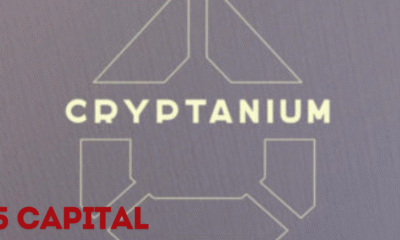
 Press Release7 days ago
Press Release7 days agoCV5 Capital Announces Standout Performance of Cryptanium Fund I SP, Beating Industry Benchmarks
-

 Business4 days ago
Business4 days agoS&P 500 Soars in Best May in Decades Amid Tariff Relief and Nvidia’s Surge
-
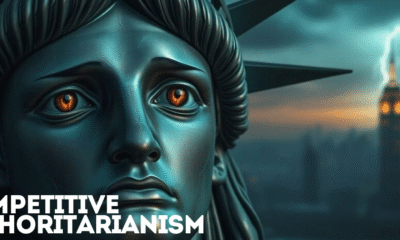
 Government7 days ago
Government7 days agoExperts Warn of U.S. Slide Towards Authoritarianism Under Trump Administration
-

 Healthcare5 days ago
Healthcare5 days agoAttention Economy Arms Race: Reclaim Your Focus in a World Designed to Distract You
-

 Immigration4 days ago
Immigration4 days agoTrump’s Immigration Crackdown: Legal Battles and Policy Shifts
-

 Business4 days ago
Business4 days agoUS Stock Market Soars in May Amidst Tariff Tensions and Inflation Worries
-

 Government4 days ago
Government4 days agoTrump Administration’s Government Reshaping Efforts Face Criticism and Legal Battles
-

 Business4 days ago
Business4 days agoTrump’s Tariffs: A Global Economic Reckoning




